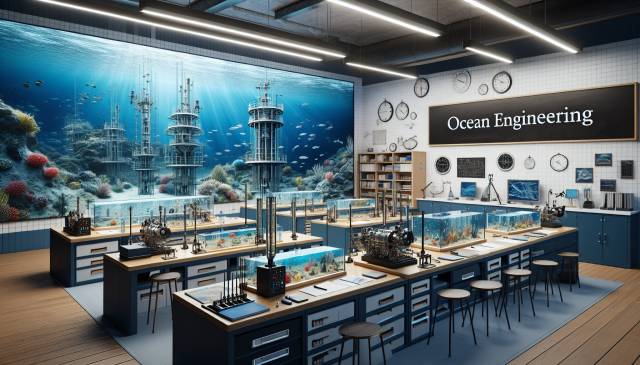
Ocean engineering is a fascinating field that combines principles from various disciplines to address the challenges and opportunities presented by our oceans. As our world grapples with climate change, rising sea levels, and the increasing demand for marine resources, the need for skilled ocean engineers has never been greater. In this blog post, we'll dive into the essentials of ocean engineering education, exploring course offerings from leading institutions and the skills needed to thrive in this dynamic field.
What is Ocean Engineering?
Ocean engineering involves the design, construction, and maintenance of structures and systems in the marine environment. This includes a wide array of projects such as:
- Offshore oil and gas platforms
- Marine renewable energy systems (e.g., wind, wave, and tidal energy)
- Coastal protection structures (e.g., sea walls, jetties)
- Underwater vehicles and robotics
- Marine transportation systems
As a multidisciplinary field, ocean engineering draws from various areas such as civil engineering, mechanical engineering, environmental science, and marine biology. This breadth of knowledge is crucial for tackling the complex issues faced in marine environments.
Why Pursue a Degree in Ocean Engineering?
Choosing to study ocean engineering comes with numerous benefits:
- Job Opportunities: The demand for ocean engineers is on the rise due to increased investment in renewable energy and marine technologies.
- Impactful Work: Youâll be at the forefront of tackling climate change, marine conservation, and sustainable resource management.
- Interdisciplinary Collaboration: Work alongside experts from various fields, enhancing your problem-solving skills and expanding your professional network.
- Innovation and Technology: Engage with cutting-edge technologies and innovative practices that push the boundaries of engineering.
Course Offerings in Ocean Engineering
Many universities around the world offer specialized programs in ocean engineering. Hereâs a look at some notable institutions and the courses they provide:
1. Massachusetts Institute of Technology (MIT)
MIT offers a comprehensive ocean engineering program that focuses on both theoretical and practical aspects of the field. Key courses include:
- Introduction to Ocean Engineering
- Fluid Mechanics in Ocean Engineering
- Marine Renewable Energy
- Dynamics of Offshore Structures
2. University of California, Berkeley
UC Berkeley's program emphasizes research and practical applications. Highlighted courses are:
- Coastal Engineering
- Hydrodynamics of Marine Structures
- Marine Robotics
- Environmental Fluid Mechanics
3. University of Southampton
In the UK, the University of Southampton provides an internationally recognized program in ocean engineering, featuring courses like:
- Marine Technology
- Ocean Wave Energy
- Subsea Engineering
- Ship Design and Construction
Skills Needed for Ocean Engineers
To excel in ocean engineering, students should focus on developing a range of essential skills, including:
- Analytical Skills: Ability to analyze complex systems and data.
- Problem-Solving: Creative thinking to devise innovative solutions for marine challenges.
- Technical Proficiency: Familiarity with engineering software and tools used in design and simulation.
- Communication: Strong written and verbal skills for effective collaboration with multidisciplinary teams.
- Project Management: Skills to manage projects from inception to completion, ensuring they are delivered on time and within budget.
Conclusion
Ocean engineering stands at the intersection of technology and environmental stewardship, offering students a unique opportunity to make a significant impact. With the right education and skills, aspiring engineers can play a pivotal role in shaping the future of our oceans and the sustainable use of marine resources. Explore the various courses available and consider embarking on this rewarding educational journey.

